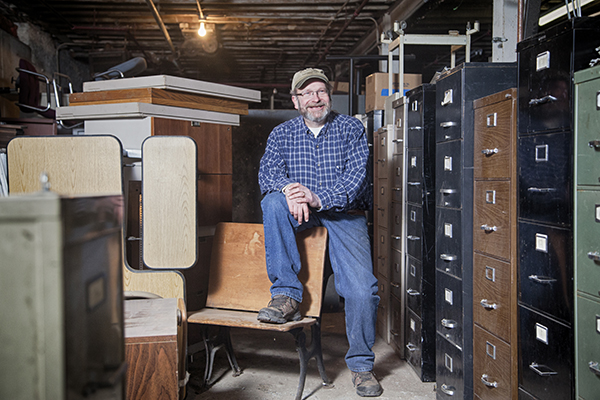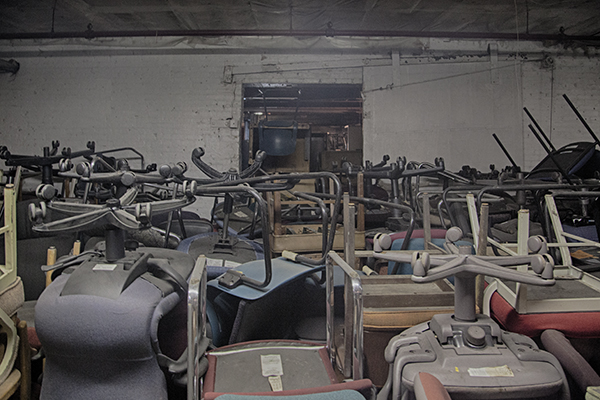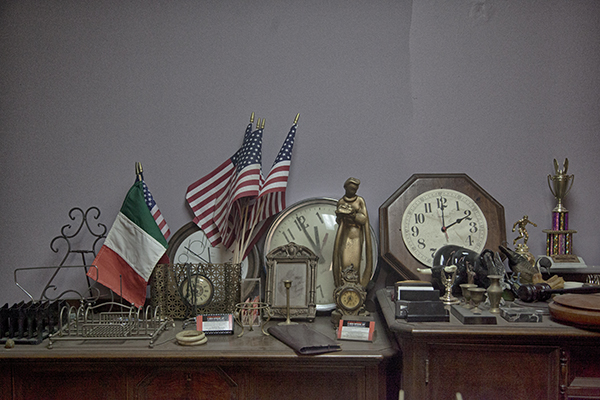Betting on Detroit and beating the odds: Franklin Furniture’s survival story
For decades, Franklin Furniture has offered Detroit residents and businesses affordable furnishings. Despite encountering more than his fair share of adversity, Jim Snyder, Franklin's owner, remains bullish on the city.
In an old industrial district just west of Detroit’s historic Woodbridge neighborhood, 5062 Loraine St. looks like any other turn-of-the-century industrial building in the city. At a glance you might even think it vacant, but the inconspicuous warehouse is home to perhaps the largest and most eclectic dealer of used furniture in the city.
Jim Snyder’s Franklin Furniture has quietly made a new home on Loraine Street, having moved there just over a year ago from its longtime location in downtown Detroit’s Warehouse District. Furniture of all kinds is piled tightly into every room of the new location. Desks, chairs, display racks, filing cabinets, lamps, and more are chaotically crammed into every square foot, though there’s a method to the madness, as Snyder shows when he adroitly navigates his inventory.
Whatever your furniture needs, Jim Snyder can help you find what you’re looking for — and at a great price. In addition to the used furniture for which Franklin is best known, the company also offers a line of new items through its own catalog.
While Franklin’s Loraine street locale doesn’t quite have the visual appeal of its former larger space on Franklin Street, Snyder is undeterred. He says the loss of 5,000 square feet of space hasn’t had a major effect on the business.
“If the phone rang today and there was a law firm that was closing down, and he had 50 people and all the equipment that goes with them and I made a deal with him, I’d figure it out,” says Snyder. “That’s the beauty of Detroit…there are always buildings available.”
A Detroit stalwart
Founded as Buckland Van Wald Furniture, Franklin Furniture was originally located on Larned Street across from Cobo Center (then known as Cobo Hall).
“My dad and his partner bought [the business] in 1968 from the original owner, Mr. Buckland,” says Snyder. Following the civil unrest of the summer of 1967, Buckland soured on the city. “He didn’t want to do it anymore…he wanted to get out of Detroit,” says Snyder.
Edward Snyder, Jim’s father, worked at Buckland Van Wald since he was a young man. His father (Jim’s grandfather) had worked there before him. A lifelong, dedicated Detroiter, Edward was determined to keep the store running, an attitude that inspires Jim to this day. “He was always promoting Detroit, always trying to get people to understand that you can’t keep running away from the city.”
Doing business in Detroit wasn’t always easy, though.
Starting in the 1980s and into the 1990s, Jim and his father fought a long legal battle with the city of Detroit, which sought to claim the Buckland Van Wald building and surrounding area through eminent domain to accommodate the expansion of Cobo Hall, the city’s convention center. The business had already survived a previous attempt by the city to take its property to build a transit stop for the People Mover, the city’s 2.9-mile elevated monorail loop. (The stop was eventually installed at what is now the Rosa Parks Transit Center on Cass Avenue.)
Because of the impending expansion of Cobo Hall and mounting costs from eight years of legal wrangling, the Snyders worked out a deal with the city and moved to a new location on Franklin Street along Detroit’s east riverfront.
But financial problems followed the business and the state seized its inventory around the time of the move. Jim decided to take over from his father and purchased the inventory at state auction, officially renaming the business Franklin Furniture to reflect the new location. Stability was short-lived, however, and the business was again displaced when its building was sold to a charter school operator, forcing Snyder to move to a second Franklin Street location.
After years at 2128 Franklin St., structural issues and an impending rent increase prompted Snyder’s move out of downtown to his current location on Loraine Street. (He has also had problems getting the change marked on Google Maps, which he continues to work to resolve.)
Snyder also lost an employee during the move when the city of Detroit left a notice on the door of the new location on Loraine, alleging that proper permits and paperwork had not been completed and threatening to lock the doors. Though the situation was quickly resolved, the employee was concerned about his job security and chose to find other work while Snyder straightened out the details with the city.
Yet despite Snyder’s many challenges, he remains bullish on Detroit and is committed to serving the city. He currently employs eight people and is considering bringing on an additional employee in the near future.
Adapting to a changing city
Franklin survives mainly through Snyder’s network of contacts, which he has built over the years thanks to word-of-mouth from his customers.
After taking over in 1988, Snyder’s big clients were mainly nonprofit entities looking for cheaper, serviceable used furniture to fill their offices and workspaces. “The bigger customers that I had were nonprofits,” says Snyder. “American Red Cross and Lutheran Social Services were both huge customers of mine. Because of having so much used furniture, we were a perfect fit for the nonprofits and startups.”
The store filled this niche role so effectively that some local branches of national organizations like Red Cross bucked the trend of using national suppliers to instead work with Franklin Furniture, helping reduce costs and gaining Snyder even more clients as word spread about his more price-friendly, local alternative.
At the dawn of the Great Recession, business was brisk as so many offices and business closed and liquidated their inventories. Other companies were tightening their belts and turned to used furniture as a cheaper alternative. As the recession dragged on, however, business slowed to a crawl. “Everything stopped at one point. The entire world died,” Snyder recalls.
The film industry in Michigan, especially after the state’s creation of film incentive tax credits in 2008, threw Snyder a lifeline in times of economic uncertainty. Before 2008, Snyder had supplied various films like “Collision Course” (1989) and “8 Mile” (2002) with set furniture, but Snyder credits the film incentives with helping him keep his doors open in an otherwise very bleak business environment. “That was probably what kept me going…it was huge for us,” he recalls. (Michigan’s film incentives have been cut in recent years, and a bill was recently introduced to the Michigan House of Representatives to end all film incentives by October 2015.)
Most recently “Batman vs. Superman” contracted with Franklin to provide furniture for sets, but many of the business’s film industry clients are smaller indie studios in search of an affordable and easy source for set materials.
Individual customers, too, are an important part of Snyder’s business. Franklin Furniture is open to the public Monday through Friday from 8 a.m. to 4 p.m. Franklin offers a full line of new furniture in addition to their vast selection of used inventory and provides free local delivery on larger items, perfect for locals who don’t have easy access to a truck or van.
—
Scott Halliday is a freelance writer residing in Detroit’s Historic Woodbridge District.







